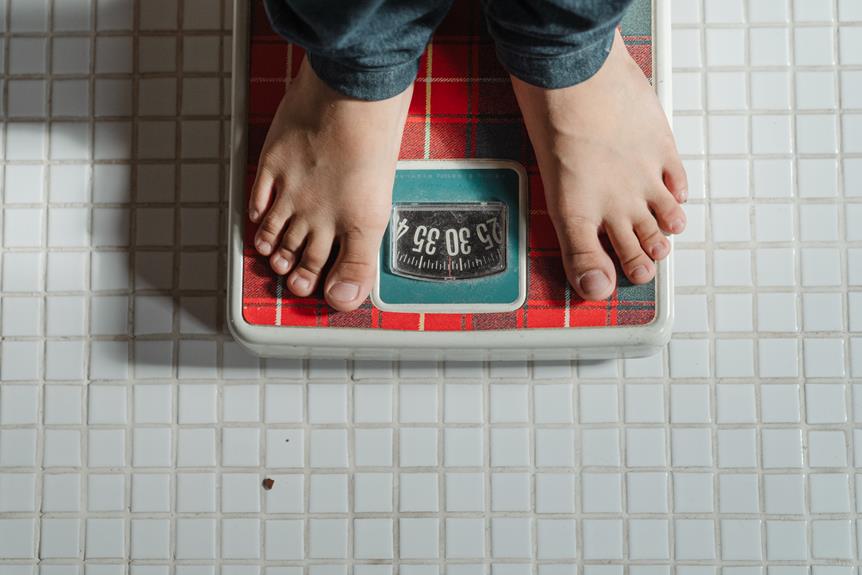Can Birth Control Influence Weight Gain

In the realm of reproductive health, the question of whether birth control influences weight gain has been a subject of much speculation.
This article aims to shed light on this matter, exploring the intricate relationship between hormonal birth control and metabolism.
By debunking common misconceptions, examining different types of birth control, and identifying factors that may contribute to weight changes, we will equip you with expert tips to manage your weight while using birth control.
Join us on this informative journey towards a healthier you.
Key Takeaways
- Birth control methods may impact weight gain for some individuals, but it is not a universal side effect and varies from person to person.
- Scientific evidence consistently debunks the correlation between birth control and weight gain, and research has not conclusively proven a direct link between the two.
- Hormonal birth control can influence metabolism and appetite control, potentially leading to weight gain, but individual responses can vary.
- Different forms of birth control can impact body weight differently, with hormonal contraceptives being more likely to cause weight gain compared to non-hormonal options.
The Relationship Between Birth Control and Weight Gain
The current discussion topic revolves around the potential correlation between the use of birth control and the occurrence of weight gain. Many women are concerned about the long-term effects of using birth control methods on their weight management strategies.
It is important to understand that birth control methods, such as hormonal contraceptives, may have an impact on weight gain for some individuals. However, it is crucial to note that weight gain is not a universal side effect and varies from person to person.
For those who experience weight gain while using birth control, it is recommended to focus on adopting healthy lifestyle habits, including regular exercise and a balanced diet, to manage their weight effectively. Additionally, consulting with healthcare professionals can provide valuable guidance and support in developing personalized weight management strategies.
Understanding Hormonal Birth Control and Metabolism
Hormonal birth control can have a significant impact on metabolism, influencing various physiological processes in the body. One area of interest is the relationship between birth control and appetite control.
Some studies have suggested that certain hormonal contraceptives can increase appetite, leading to weight gain. However, the evidence on this topic is mixed, with some studies showing no significant impact on appetite.
Additionally, birth control methods that contain progestin, a synthetic form of the hormone progesterone, have been found to potentially decrease muscle mass. This can further contribute to changes in body composition and weight.
It is important to note that individual responses to hormonal birth control may vary, and factors such as diet, exercise, and genetics can also play a role in weight management.
In the next section, we will debunk common myths about birth control and weight gain, providing a more comprehensive understanding of this topic.
Debunking Common Myths About Birth Control and Weight Gain
There are several common myths surrounding the relationship between birth control and weight gain. However, scientific evidence has consistently debunked these myths.
It is important to understand the facts and dispel the misconceptions to make informed decisions about birth control methods.
Myth or Reality
Contrary to popular belief, the correlation between birth control and weight gain remains a subject of ongoing debate in the medical community. While some individuals may report weight gain as a potential side effect of certain birth control methods, research has not conclusively proven a direct link between the two. Individual experiences vary greatly, and factors such as genetics, lifestyle, and hormonal changes can all contribute to weight fluctuations.
To further explore this topic, let's consider the following table:
| Birth Control Method | Reported Weight Gain | Reported No Weight Gain | Inconclusive |
|---|---|---|---|
| Oral Contraceptives | Yes | No | Yes |
| Hormonal IUD | Yes | No | Yes |
| Barrier Methods | No | Yes | Yes |
It is important to note that these reported experiences do not represent a universal truth. Each individual may respond differently to birth control methods. Therefore, it is crucial to consult with healthcare professionals to determine the most suitable option based on individual needs and concerns.
Scientific Evidence Explained
Based on the current scientific evidence, recent studies have shed light on the complex relationship between birth control and weight gain, providing a more nuanced understanding of this topic.
There have been conflicting findings regarding the association between birth control and weight gain, with some studies suggesting a link, while others finding no significant impact. However, a comprehensive review of long-term studies has revealed that the effects of birth control on weight gain are generally minimal and vary depending on individual factors such as age, genetics, and lifestyle.
It is important to note that any weight gain experienced while on birth control is likely to be modest and can often be attributed to factors other than the contraceptive method itself, such as changes in appetite or water retention.
Transitioning into the subsequent section, exploring different types of birth control and their effects on weight, further research is needed to fully understand the specific mechanisms through which certain methods may influence weight.
Exploring Different Types of Birth Control and Their Effects on Weight
The study aims to investigate the correlation between various forms of birth control and their impact on body weight. Exploring side effects and alternatives to hormonal contraceptives is crucial for individuals seeking to make informed decisions about their reproductive health. Understanding the potential effects of different types of birth control on weight can help healthcare providers better serve their patients.
Some factors that may contribute to weight changes while on birth control include:
- Hormonal contraceptives: Certain hormonal contraceptives, such as combination pills or hormonal IUDs, have been associated with weight gain.
- Non-hormonal contraceptives: Non-hormonal methods, such as barrier methods or copper IUDs, are less likely to cause weight changes.
It is important to consider these factors when discussing birth control options with patients, as weight changes can have a significant impact on overall well-being and body image. By providing comprehensive information, healthcare professionals can support individuals in making the best choices for their reproductive health.
Factors That May Contribute to Weight Changes While on Birth Control
Exploring the relationship between hormonal contraceptives and weight gain is essential for understanding the factors contributing to weight changes while on birth control.
There are common misconceptions surrounding the idea that hormonal contraceptives directly cause weight gain. However, research suggests that hormonal changes caused by birth control may contribute to weight fluctuations.
While some individuals may experience weight gain while using hormonal contraceptives, others may not see any significant changes. Factors such as individual metabolism, lifestyle choices, and genetic predisposition can also play a role in weight changes while on birth control.
It is important to note that weight gain associated with hormonal contraceptives is usually minor and can be managed through healthy eating habits and regular physical activity.
Open and honest discussions with healthcare providers can help dispel any misconceptions and provide personalized guidance regarding weight management while on birth control.
Expert Tips for Managing Weight While Using Birth Control
Implementing targeted dietary strategies and engaging in regular exercise can effectively assist individuals in maintaining a healthy weight while utilizing birth control methods, according to expert advice. When considering weight management strategies while on birth control, it is important to be aware of potential side effects and take proactive steps to address them. Some birth control methods may cause weight gain, while others may have no effect or even lead to weight loss. To effectively manage weight while using birth control, consider the following:
- Choose a birth control method with minimal weight gain side effects, such as non-hormonal options or low-dose hormonal methods.
- Maintain a balanced diet rich in fruits, vegetables, whole grains, and lean proteins.
- Engage in regular physical activity, including cardiovascular exercises and strength training.
- Monitor weight regularly and adjust dietary and exercise routines as needed.
- Consult with healthcare professionals for personalized guidance and support.
Frequently Asked Questions
Are There Any Birth Control Methods That Do Not Cause Weight Gain?
There are several birth control options available, including hormonal contraception. When considering birth control methods, it is important to discuss potential side effects, such as weight gain, with your healthcare provider.
Can Birth Control Pills Be Used as a Weight Loss Tool?
While birth control pills are primarily used for contraception, some individuals believe they may aid in weight loss due to their potential impact on metabolism. However, the effectiveness of birth control for weight loss remains uncertain and requires further research.
Does Weight Gain From Birth Control Occur Immediately or Over Time?
Weight gain from birth control can occur immediately or over time. Immediate weight gain may be due to fluid retention, while long-term weight gain may result from changes in metabolism or appetite. It's important to consult with a healthcare provider for personalized information and advice.
Can Birth Control Cause Weight Gain in Some Individuals but Not Others?
Birth control can cause weight gain in some individuals but not others due to its effects on metabolism and hormonal changes. It is important to understand that each person's response to birth control may vary.
Are There Any Specific Dietary or Lifestyle Changes That Can Help Prevent Weight Gain While on Birth Control?
To prevent weight gain while on birth control, individuals can focus on maintaining a balanced and healthy diet, engaging in regular physical activity, and managing stress levels. These lifestyle changes can help manage weight while on contraception.








